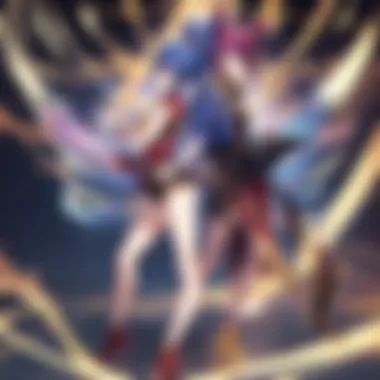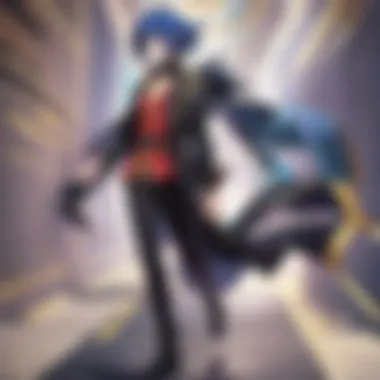Exploring the Cultural Impact of Yu-Gi-Oh


Intro
The Yu-Gi-Oh franchise has garnered a substantial following across various media forms, including manga, anime, and trading card games. This article aims to dissect and present a detailed examination of all that this extensive universe has to offer. With its rich narrative layers, a diverse cast of characters, and complex gameplay mechanics, Yu-Gi-Oh remains not only a prominent figure in the realm of anime and gaming but also a cultural phenomenon that resonates with fans globally.
Through this study, readers will explore the multifaceted aspects of Yu-Gi-Oh, from character evolution to thematic depth, while appreciating its lasting influence in contemporary pop culture.
Featured Series or Manga
Overview of the Series
Yu-Gi-Oh began as a manga series created by Kazuki Takahashi, first serialized in 1996. It centers around Yugi Mutou, a boy who solves an ancient Egyptian puzzle known as the Millennium Puzzle, which leads to the awakening of a spirit. This spirit, known as the Pharaoh, grants Yugi extraordinary skills in a card game called Duel Monsters, setting the stage for countless adventures and duels.
The success of the manga led to its adaptation into an anime series, multiple films, and a trading card game, which remains one of the best-selling card games worldwide. The core premise explores themes of friendship, strategy, and the importance of self-discovery, while engaging audiences with intricate duel mechanics and character-driven plots.
Key Characters and Development
Central to the franchise's narrative are its well-crafted characters. Yugi Mutou, the protagonist, demonstrates significant growth. Throughout the series, he evolves from a timid boy into a confident duelist, reflecting themes of friendship and courage. Other notable characters include Seto Kaiba, a rival who embodies ambition and rivalry, alongside characters such as Joey Wheeler and Tea Gardner, who showcase loyalty and support, enriching the storyline further.
- Yugi Mutou: Represents growth and courage.
- Seto Kaiba: A complex rival symbolizing ambition.
- Joey Wheeler: Embodies loyalty and friendship.
- Tea Gardner: Illustrates support and resilience.
Character Analysis
Major Characters
The various characters within Yu-Gi-Oh are significant for their charisma and depth. Each character's backstory and motivations allow for a rich exploration of personal triumphs and struggles. What makes the franchise stand out is the detailed crafting of their personalities, reflecting a spectrum of human emotions and experiences.
Character Arcs and Growth
The arcs of these characters are often tied to the duels they engage in. For instance, Yugi's journey reveals his internal battles as he delves into his connection with the Pharaoh. Seto Kaiba’s character often grapples with his own past and the pressure of expectations, illustrating how circumstances shape one’s destiny. Other characters, such as Mai Valentine and Bakura, add layers to the narrative, showcasing transformations that resonate with audiences.
"The success of Yu-Gi-Oh lies not just in cards or duels but in how its characters evolve through their journeys and relationships."
Thematic Exploration
Main Themes and Messages
Several themes are interwoven within the Yu-Gi-Oh narrative. Friendship and loyalty play a crucial role, guiding character interactions and decisions. Another significant theme is the concept of fate versus free will, as characters often confront their destinies through duels, questioning their control over outcomes. Each duel serves as a microcosm of life’s challenges, promoting strategies and critical thinking.
Cultural Context and Influences
Yu-Gi-Oh has significantly influenced global pop culture. Its emergence during the late 90s coincided with a surge in interest towards collectible card games and anime. Incorporating elements of both Japanese and Western storytelling has widened its appeal. The series not only entertains but also introduces viewers to broader themes of ethics, conflict, and the human condition. In essence, it acts as a bridge between diverse cultures through its engaging format and universal messages.
Preface to Yu-Gi-Oh
The realm of Yu-Gi-Oh is a significant part of modern anime and gaming culture. This introduction serves as a foundation for understanding the franchise's vital components. Yu-Gi-Oh acts not just as a form of entertainment, but as a cultural phenomenon that has shaped its audience’s experience in multifaceted ways.
Importance of Exploring Yu-Gi-Oh
The significance of Yu-Gi-Oh lies in its unique combination of compelling storytelling, engaging gameplay, and rich character development. This franchise has maintained relevance through the years by evolving with its audience. As people grow older, their needs from entertainment change, and Yu-Gi-Oh has adapted to these changes while retaining its core identity.
Engagement with this franchise models deeper concepts such as strategy and competition, mirroring the challenges faced in real-life situations. Players and viewers alike can find something relatable within its narrative.
"Yu-Gi-Oh is more than just a card game; it's about the connections we make and the challenges we overcome."
Origins of the Franchise


The origins of Yu-Gi-Oh can be traced back to a manga created by Kazuki Takahashi. The first chapter was published in 1996 in a shonen manga magazine. The story revolves around Yugi Muto, a boy who solves the ancient Egyptian puzzle known as the Millennium Puzzle. This puzzle unlocks a powerful spirit within Yugi, which sets the stage for the series' narrative.
With its initial focus on a variety of games, it wasn't until the introduction of the Duel Monsters card game that the franchise found its hallmark. The success of the card game led to anime adaptations, further promoting the concept to a broader audience. These early stages were crucial in establishing a dedicated fan base that thrives to this day.
The Evolution of Yu-Gi-Oh
Since its inception, Yu-Gi-Oh has undergone significant changes that reflect the evolving landscape of consumer interests. The franchise expanded from the original manga to multiple anime series, films, and merchandise. Each new iteration introduced new characters, themes, and gameplay mechanics.
The introduction of the Yu-Gi-Oh Trading Card Game was a turning point. Initial versions were simple, but as players demanded more complexity, the game evolved. Innovations such as new card types and advanced play strategies kept the franchise fresh and engaging for long-time fans.
Moreover, new series like Yu-Gi-Oh! Zexal and Yu-Gi-Oh! Arc-V have expanded the lore and introduced different formats, strategies, and aesthetics. Through all these changes, Yu-Gi-Oh has managed to maintain its appeal while pushing boundaries to remain relevant in competitive gaming and anime.
Character Analysis in Yu-Gi-Oh
Character analysis is pivotal in understanding Yu-Gi-Oh's lasting appeal and narrative depth. The characters not only drive the story forward but also embody the various themes that resonate with the audience. By closely examining the attributes, motivations, and development of these characters, we gain insight into how they connect with fans and enhance the overall experience of the franchise. Each character brings a unique perspective to the table, influencing plot dynamics and personal interactions. This section will explore key figures, shedding light on their significance in the series and the role they play in enriching the Yu-Gi-Oh universe.
Main Protagonists
Yugi Muto
Yugi Muto is the central figure of Yu-Gi-Oh and represents the heart of the story. His complex personality combines strength and vulnerability, making him relatable to viewers. Yugi's key characteristic is his unwavering ability to challenge overwhelming odds. This trait is essential to the series, exemplifying the theme of perseverance. A unique feature of Yugi is the duality he represents; as both a kind-hearted teenager and the formidable Pharaoh Atem. This complexity highlights the internal struggle faced by individuals when navigating personal conflicts. Yugi's journey from a timid boy to a courageous hero serves as an inspiration, engaging audiences effectively.
Seto Kaiba
Seto Kaiba is a compelling character driven by ambition and rivalry. His key characteristic lies in his relentless pursuit of power and recognition. This ambition shapes his role as both an antagonist and ally to Yugi. A unique feature of Kaiba is his technological prowess and mastery of the Duel Monsters game. His character arc reflects the darker side of ambition, illustrating how it can lead to isolation. Kaiba’s complex personality adds depth to the series, making him an intriguing choice for analysis in this article.
Joey Wheeler
Joey Wheeler serves as a contrasting figure to Yugi and Kaiba. His key characteristic is loyalty, often prioritizing friendships over competition. Joey’s comedic yet earnest demeanor offers lighter moments in the series, appealing to a broad audience. A unique feature of Joey is his journey from an underdog to a skilled duelist. This transition signifies growth and determination. While he may not possess the same strategic acumen as some of his peers, his grit and perseverance endear him to fans. Examining Joey’s role illuminates the importance of camaraderie in Yu-Gi-Oh.
Supporting Characters
Tea Gardner
Tea Gardner is a significant supporting character, representing support and moral grounding. Her key characteristic is her unwavering support for her friends, particularly Yugi. This aspect emphasizes the theme of friendship within the series. A unique feature of Tea is her growth as a character; she learns to assert herself while encouraging her friends. While sometimes overshadowed by the male protagonists, Tea's role is crucial in maintaining the emotional core of the group.
Téa Gardner's Role
Téa Gardner's role extends beyond being a supportive friend. Her key characteristic is her determination to become a skilled duelist. This ambition highlights the desire for self-improvement. A unique feature of her character is her ability to motivate others in the face of adversity. Téa’s transformation is vital for illustrating how support systems can impact personal growth. Her contributions ensure that the narrative remains balanced and relatable.
Noah Kaiba's Significance
Noah Kaiba introduces complexity through his familial connection to Seto Kaiba. His key characteristic is his manipulative nature, which sets him apart from other characters. This trait amplifies the dramatic tension as he attempts to control the game and its players. A unique feature of Noah's character is his virtual world, symbolic of escapism and control. Analyzing Noah's role provides insight into the darker aspects of competition and the underlying family dynamics within the series.
Antagonists and Their Motivations
Maximillion Pegasus
Maximillion Pegasus is a vital antagonist who epitomizes cunning and ambition. His key characteristic is his creativity and strategic mind, which he utilizes to manipulate duels. This intelligence contributes to his role in the story as a formidable foe for Yugi. A unique feature of Pegasus is his ability to create powerful cards like the Blue-Eyes White Dragon. His character raises important themes about the consequences of greed and the manipulation inherent in power struggles.
Marik Ishtar
Marik Ishtar stands out as one of the more complex antagonists in the series. His key characteristic is duality; he hosts differing personalities that reflect internal conflict. This characteristic deepens the narrative, as Marik's motivations stem from a painful past. A unique feature of Marik is his connection to ancient Egyptian lore, enriching the overall mythology of Yu-Gi-Oh. Understanding Marik provides insights into themes of destiny and revenge.


Dartz
Dartz serves as a significant villain whose ambition and manipulation drive the latter arcs of the series. His key characteristic is his cold and calculated demeanor, which presents a stark contrast to other characters. A unique feature of Dartz is his philosophy concerning the souls of duelists, which adds a layer of darkness to his motivations. Examining Dartz reveals the series’ exploration of existential themes and the moral implications of power.
"Character development in Yu-Gi-Oh not only drives the plot but also unearths complex themes of friendship, rivalry, and power. Each character brings forth a unique narrative that resonates deeply with audiences."
In analyzing these characters, we discover their contributions to the overarching narrative of Yu-Gi-Oh. Understanding their motivations and traits unlocks further discussions on the central themes that have cemented Yu-Gi-Oh's place in pop culture.
Gameplay Mechanics
Understanding the gameplay mechanics of Yu-Gi-Oh is essential for both newcomers and veterans of the franchise. These mechanics not only define how the game is played but also serve as a bridge connecting the strategic depth of the game to its narrative themes. The significance of gameplay mechanics lies in their ability to enhance player engagement and create opportunities for developing strategies. This section will navigate through the foundational aspects of the game, including its basic rules, strategic complexities, and the landscape of competitive play.
Card Game Basics
At its core, Yu-Gi-Oh is a trading card game where players duel against each other using decks of cards they build. The game involves various card types, including Monster, Spell, and Trap cards. Each card has unique attributes and effects that contribute to the overall strategy of gameplay. Players aim to reduce their opponent's Life Points to zero, securing victory. This objective is pursued through a series of turns where players summon monsters, activate spells, and use traps to outwit their opponents.
Key components of the card game include:
- Deck Building: Every player must construct a well-balanced deck of at least 40 cards. Choices matter here, as a good mix of monster types and spell effects can define a strategy.
- Turn Phases: Each turn consists of specified phases—Draw, Standby, Main Phase 1, Battle, Main Phase 2, and End Phase. Understanding these phases is crucial for optimizing plays and counterplays.
- Summoning Mechanics: Players can summon monsters in different ways, such as Normal Summon, Flip Summon, and Special Summon, affecting the flow of the duel.
In summary, mastering the basic rules and structure of the game sets the stage for deeper strategic exploration.
Advanced Strategies
As players become more familiar with the basics, they can delve into advanced strategies that elevate their gameplay. These strategies are often shaped by the synergy between cards, the ability to anticipate opponents' moves, and optimizing resource management.
Some advanced concepts include:
- Card Synergy: Building a deck around complementing cards can lead to powerful combinations. Understanding how different cards interact enhances one's strategic options.
- Resource Management: Successful players need to manage their cards carefully, balancing offense and defense. Playing the right card at the right moment can turn the tide of a duel.
- Meta Awareness: The competitive scene often revolves around popular deck archetypes. Understanding the current meta allows players to anticipate potential threats and tailor their strategies accordingly.
"Advanced strategies are not just about individual card strength; they depend on how players blend their entire deck into a cohesive plan."
Competitive Play and Tournaments
Competitive play is where Yu-Gi-Oh truly shines. The structured environment of tournaments offers players the chance to test their skills against others with similar interests. Engaging in competitions takes the gameplay experience to another level, driving players to refine and perfect their strategies.
Several aspects make competitive play notable:
- Tournaments Structure: Various formats exist, including standard, advanced, and side events. Each format may require specific card rules, affecting overall strategy.
- Skill Development: Competing regularly sharpens players’ abilities. It encourages the exploration of advanced mechanics, making them more adept at decision-making under pressure.
- Community Interaction: Competitive play fosters community. Players can discuss strategies, share tips, and even form friendships, enhancing the overall experience.
Themes and Motifs
The themes and motifs present in Yu-Gi-Oh serve as a crucial backbone to its narrative structure and character development. They elevate what could be a simple card game into a complex story that resonates with audiences across generations. Key elements such as friendship, trust, the nature of conflict, and the implications of power reveal deeper truths that connect with the audience on an emotional level. This section delves into these themes, discussing their significance and the ways they enrich the viewer's experience.
Friendship and Trust
Friendship is a central theme in Yu-Gi-Oh, highlighted through the bonds that characters form during their journeys. The relationship between Yugi Muto and his friends, particularly Joey Wheeler and Téa Gardner, exemplifies this theme. They face adversities not just as individual duelists but as a united front, showcasing how collective strength can overcome challenges. Trust becomes pivotal in these relationships, especially during high-stakes duels where the outcome affects more than just the individual. Moments where Yugi relies on his friends’ support amplify the narrative, emphasizing that true strength goes beyond personal skill. This theme is so significant that it serves to guide characters’ motivations and decisions, adding emotional depth to their arcs.
The Duel as a Metaphor
Dueling in Yu-Gi-Oh transcends a mere game of strategy. It acts as a metaphor for conflict resolution and personal growth. Each duel characterizes a struggle between opposing ideologies or personal goals, reflecting real-life conflicts. For example, when Yugi faces Seto Kaiba, it symbolizes not just a battle for supremacy but also a clash of differing worldviews. The stakes in these duels represent broader themes of justice, morality, and ambition. As duels unfold, the outcomes often lead to character revelations or transformations, illustrating that victory or defeat has implications that reach far beyond the card table. This metaphorical layer enhances the viewers' engagement, making them contemplate the consequences of power and the essence of victory.
Consequences of Power


The theme of power and its consequences runs deep throughout Yu-Gi-Oh. Characters are often faced with the question of how they choose to wield power. Maximillion Pegasus, for instance, embodies the darker side of ambition and desires for control, ultimately leading to his downfall. The series illustrates that power, while enticing, carries moral and ethical implications. It reflects the idea that the misuse of power can lead to destruction, both personally and externally. Through characters such as Yugi and Joey, the narrative conveys that true strength lies not in overwhelming force but in understanding one's limitations and responsibilities. This theme serves as a cautionary tale, urging the audience to reflect on their values.
"In Yu-Gi-Oh, every duel reveals more than just a card game; it reveals the character's essence and the morals we carry."
Through these interconnected themes and motifs, Yu-Gi-Oh transcends its roots, becoming a meaningful exploration of human connections and moral dilemmas. The series challenges viewers to consider their own beliefs around friendship, conflict, and power, further solidifying its place as a significant part of pop culture.
Impact on Pop Culture
The impact of Yu-Gi-Oh on pop culture cannot be understated. It has shaped the landscape of anime and trading card games significantly since its inception. Over the years, this franchise has transcended its initial format of a manga series, evolving into a massive multimedia phenomenon. It has influenced other creators and genres, altering perceptions of what anime can achieve in terms of storytelling and world-building. The blend of relatable themes, intricate characters, and complex gameplay has made Yu-Gi-Oh a touchstone in modern entertainment.
Global Reception
Yu-Gi-Oh enjoyed a warm reception upon release. The series broke cultural boundaries, becoming popular in various countries. In Japan, the series quickly gained recognition, with the anime running on major networks and the trading card game selling millions of units. In the West, its introduction in the early 2000s met with enthusiasm, leading to a surge of interest in anime overall. The presence of Yu-Gi-Oh games on platforms like Nintendo and PlayStation contributed further to its global appeal.
"Yu-Gi-Oh's global reception illustrates how well-crafted stories can resonate across cultures."
Feedback from audiences pointed to the franchise's innovative approach to both storytelling and gaming mechanics. Critics and fans alike praised the blend of card battles with friendships and moral dilemmas. This unique combination allowed Yu-Gi-Oh to carve a niche for itself that continues to flourish today.
Influence on Other Media
Yu-Gi-Oh has notably influenced various forms of media since its inception. Other anime and manga draw inspiration from its blend of strategy and emotional storytelling. Its gameplay dynamic has been replicated in numerous shows, often forming the base for competitive narratives.
Video games have also adopted similar mechanics, emphasizing strategic depth akin to Yu-Gi-Oh’s original card game. Numerous series, such as Cardfight!! Vanguard and Force of Will, emerged, adopting themes of dueling and card strategy. Additionally, Yu-Gi-Oh has found its way into web comics and fan art, demonstrating the versatility of its concept.
Merchandise and Licensing
The merchandise of Yu-Gi-Oh exemplifies its reach within pop culture. Starting from trading cards, its product line has expanded to include video games, toys, clothing, and various collectible items. The cards themselves became cultural artifacts, appealing not only to kids but also to collectors and enthusiasts. The presence of structured tournaments, supported by licensed products, further established its legitimacy in the competitive landscape of trading card games.
Moreover, licensing deals with companies have created partnerships that allow for widespread brand exposure. Retail spaces often dedicate sections to Yu-Gi-Oh, enhancing visibility across various demographics. This strategic merchandise expansion ensures that Yu-Gi-Oh remains a prominent figure in both anime culture and the broader entertainment landscape.
In summary, Yu-Gi-Oh's significance within pop culture is extensive. Its global reception fosters a continuous interest, influencing other media and industries alike, while its merchandise ensures lasting relevance in modern society.
The Future of Yu-Gi-Oh
Understanding the future of Yu-Gi-Oh is essential for both fans and newcomers in the ever-evolving landscape of anime and gaming. This section explores how the franchise can adapt while retaining its core identity. As technology advances and audience preferences shift, Yu-Gi-Oh faces both challenges and opportunities. The strategies employed to navigate these changes will determine its long-term viability. Here, we will cover upcoming series and spin-offs, potential innovations in gameplay, and how the franchise can maintain its relevance in a competitive market.
Upcoming Series and Spin-offs
The announcement of new series and spin-offs is crucial for keeping the Yu-Gi-Oh brand lively. Recent years have seen numerous adaptations that introduced new characters and story arcs. For example, Yu-Gi-Oh! Sevens and Yu-Gi-Oh! Master Duel offer fresh narratives and gameplay styles while building on the franchise's strengths. The following are some key aspects of upcoming series:
- Diverse Storytelling: Future series aim to explore different themes, appealing to varied audiences.
- Character Depth: New protagonists and antagonists will add layers to existing narratives, enhancing character development.
- Cross-Media Projects: Collaborations with video games and mobile applications may reach broader fanbases.
These developments signify a commitment to evolving the franchise, crucial for sustaining interest among fans.
Potential Innovations in Gameplay
Innovations in gameplay are vital for attracting new players to Yu-Gi-Oh while keeping existing fans engaged. The franchise must consider integrating modern technology and trends. Some promising innovations could include:
- Virtual Reality Experiences: VR can bring dueling to life, making it more immersive.
- Augmented Reality Features: Utilizing AR can enhance card interaction, blending the physical and digital realms.
- Dynamic Card Mechanics: These mechanics can create more varied and compelling duels, keeping gameplay fresh and challenging.
Embracing these innovations can contribute significantly to the longevity of the game.
Maintaining Relevance in a Changing Industry
To remain a prominent figure in the gaming and anime industry, Yu-Gi-Oh must adapt to shifting trends. This requires a keen understanding of what resonates with audiences today. Some strategies include:
- Engagement with the Community: Actively involving fan feedback in the decision-making process will ensure the franchise remains relatable.
- Selective Collaborations: Partnering with popular creators or trending properties can captivate new audiences.
- Consistent Quality: Ensuring high production values will keep existing fans satisfied and attract new ones.
By focusing on these elements, Yu-Gi-Oh can continue to thrive amid competition from emerging franchises.
"The evolution of a franchise is not simply about adding new content but about understanding the audience and the environment in which it operates."



